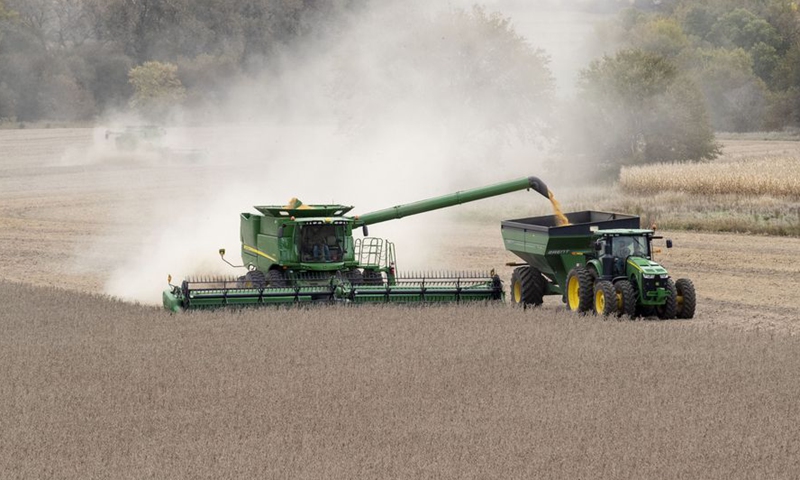China fulfills customs protocols for phase one trade deal
By Wang Cong Source: Global Times Published: 2020/11/30 20:39:49
Move is latest signal of continued implementation

soybean Photo:Xinhua
China has fulfilled its commitment under the phase one trade agreement with the US to carry out dozens of quarantine protocols that pave the way for expanding imports of US animal and plant products, a customs official said on Monday, in what experts call the latest signal of China's commitment to implement the deal beyond the upcoming US power transition.
"As of now, 37 inspections of animal and plants related to the China-US economic and trade agreement have been completed in a timely and high-quality manner," Zhao Zenglian, head of the Department of Animal and Plant Quarantine at the General Administration of Customs (GAC), said at a press briefing.
Specifically, since the phase one trade agreement took effect, the GAC has addressed issues related to market access for US potatoes, barley and pet foods, and removed a ban on US poultry imposed during an earlier bird flu epidemic, according to Zhao.
Reciprocally, Chinese citrus, fresh jujube and pears were allowed to be exported to the US, Zhao added.
"This is very clearly a positive signal that China is continuing to implement the phase one deal in line with its domestic demand and economic trends," Li Yong, deputy chairman of the Expert Committee of the China Association of International Trade, told the Global Times on Monday, adding that despite the COVID-19 pandemic, there is solid demand for US agricultural products.
Under the phase one deal that took effect in February, China agreed to expand its purchases of US farm, energy and other products by $200 billion within two years from 2017 levels.
Though the COVID-19 pandemic has disrupted global trade, and bilateral relations have been greatly damaged by a series of US aggressive moves, both sides are committed to implementing the deal, with China buying a record amount of US soybeans and other products.
In October, Chinese imports of US soybeans - a closely watched gauge of the progress of the phase one deal - skyrocketed almost 200 percent year-on-year, reaching 3.4 million tons, according to Chinese customs data. Also during the same month, China's imports of US crude reached 1.63 million tons, and those imports were expected to reach a record high of 4.63 million tons at the end of last month, according to some estimates.
"The completion of the quarantine protocols will certain pave the way for China to expand purchases of relevant US products, because some of the products, which had not passed customs inspections, are now allowed into the Chinese market," Gao Lingyun, an expert at the Chinese Academy of Social Sciences in Beijing, told the Global Times on Monday, noting that the protocols are part of China's commitment under the phase one deal.
While China has shown its commitment to carry out the phase one deal, the upcoming power transition at the White House has also brought questions about how the two economic powers will move forward with both the agreement and lingering tariffs on hundreds of billions of dollars worth of products under President-elect Joe Biden.
Although Biden is unlikely to escalate the trade war, which has brought serious damage to the US and sparked lawsuits from over 3,000 US businesses, Chinese analysts expect the deal will continue to be implemented, while both sides seek to pursue more "conventional dialogue" to address tariffs and other issues.
"I don't think Biden will inherit Trump's tariffs and I expect that both sides will address trade issues through dialogue and consultation," Li said, adding that continuing to purchase US agricultural and other products remains in line with China's domestic demand. "It's not just about the trade deal, it's mainly that we have such demand domestically."
While US officials and media outlets have been focusing on the progress on the actual purchases, Chinese experts stressed that the purchase target covers two years and should be in line with changes in China's domestic economy, global trade and US supplies.
Also, Biden's assumption of the US president will "definitely" have some impact on the implementation of the deal, though slowly, and "there is no information that suggests implementation won't continue," Gao said.
Newspaper headline: Nation fulfills customs protocols